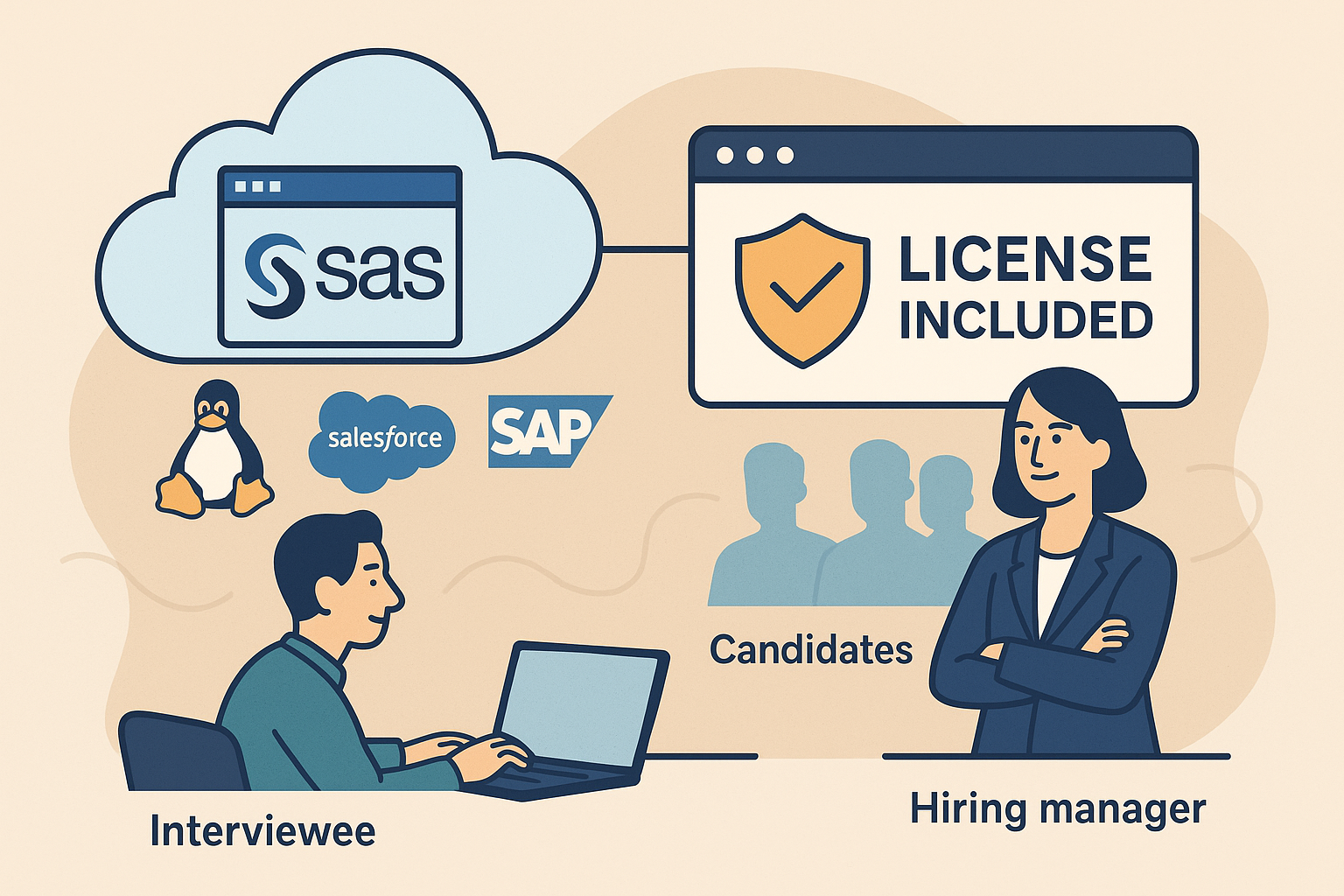Why LeetCode Interviews Are Losing Credibility—And What Companies Should Do Instead
For years, LeetCode-style interviews were the standard for hiring engineers. Want to work at a top tech company? Better be ready to reverse a binary tree while someone watches you over Zoom.
But lately, companies—and candidates—are starting to question whether these algorithm puzzles actually reflect anything about how someone performs on the job. And they’re acting on that doubt. Snapchat recently removed LeetCode-style questions from their hiring process, opting instead for more practical, relevant technical screens. And they’re not alone.
This shift isn’t just about engineering. With the rise of generative AI tools like ChatGPT and GitHub Copilot, the challenges of verifying skill and authenticity now affect nearly every role. From customer support to sales to operations, interview content that can be easily solved or mimicked by AI no longer offers a true signal of ability.
Let’s break down what’s happening—and what companies are doing instead.
The Growing Backlash Against LeetCode
To be fair, LeetCode had a purpose. It helped recruiters standardize evaluation. It gave candidates a clear way to prepare. But somewhere along the way, the interview became a game—and one that rewards memorization over mastery.
Candidates are starting to push back. One senior engineer we interviewed after a final round put it bluntly:
“I architect distributed systems that handle millions of requests per minute. But I didn’t pass because I couldn’t invert a red-black tree on the spot. That’s not how I work in real life.”
This isn’t rare. In a recent Feenyx survey, over 60% of candidates said that LeetCode-style interviews didn’t reflect their actual responsibilities. They saw them as hoop-jumping exercises—high pressure, low relevance.
And they’re right to feel that way. A study by Crosschq found that only 9% of traditional interview scores (including whiteboard coding tests) correlated with quality of hire. That’s not a skills gap. That’s a signal gap.
AI Makes It Even Worse
AI tools have completely changed the playing field. Candidates can now use ChatGPT, Copilot, or similar tools to solve algorithm challenges almost instantly. In fact, one candidate told us:
“I passed a tech screen with perfect code and didn’t write a single line myself. Copilot did 90% of it. I just cleaned it up and submitted.”
Sound like fraud? Maybe. But it also speaks to how broken the process is. If a candidate can pass your screen using a tool they’ll never have access to on the job—or can’t use effectively in real-world scenarios—you’ve created an assessment that tests little more than resourcefulness and timing.
And this problem isn’t just for engineering. In non-technical roles, we’ve seen candidates use AI to draft perfect pitch emails, generate “case study” documents, and even simulate objection handling in sales scenarios. One hiring manager shared this:
“We had a candidate for a BDR role submit the best cold email test I’ve ever seen. Later, we found it was lifted directly from ChatGPT—with slight edits. In the live call, they couldn’t replicate the tone or structure at all.”
The bottom line: if your interview can be gamed, it will be. If your screen only measures performance in artificial contexts, you’ll get artificially good candidates.
Snapchat and the Real-World Skills Movement
So what are companies doing instead?
Snapchat’s decision to ditch LeetCode made headlines in developer communities. According to a recent Reddit thread, they’ve pivoted toward practical assessments—focusing more on system design, architecture discussions, and real-world tasks that mirror daily work.
Other forward-thinking orgs are doing the same. At Feenyx, we’ve helped customers in industries from SaaS to healthcare transform their interview process using:
- Job-relevant work samples: Tasks that mirror actual deliverables—like coding in real codebases, handling support tickets, or writing live responses in simulated environments.
- Live interview co-pilots: Feenyx provides interviewers with AI-powered prompts, scoring rubrics, and real-time summaries so interviews are structured, fair, and repeatable.
- Authenticity detection: Feenyx flags suspicious behavior, second-screen usage, and AI-generated responses so you’re never hiring a résumé with a good AI prompt.
Real Results From Real Customers
One of our customers, a mid-sized logistics company, came to us after a wave of poor hires. They’d relied heavily on traditional skills tests—multiple-choice logic questions, generic take-home assignments, etc. On paper, candidates looked great. On the job, performance tanked.
After switching to Feenyx’s real-world assessments and fraud detection tools, here’s what changed:
- Time-to-hire dropped by 37%.
- Post-hire performance improved—90-day retention rose 22%.
- And perhaps most interestingly, their diversity metrics improved. When they focused on skills instead of signals like pedigree or interview polish, more non-traditional candidates made it through.
The VP of Talent told us:
“We finally feel like we’re hiring people for what they can actually do—not just how good they are at gaming interviews.”
The Problem Isn’t LeetCode—It’s Irrelevance
Let’s be fair: LeetCode itself isn’t evil. Some engineers enjoy it. Some use it to sharpen problem-solving skills. The problem is when it becomes your only bar for competence.
In today’s environment—where every candidate can use AI to inflate their skill profile—you need assessments that reflect how someone will actually show up and perform. Whether that’s live coding, async video responses, or data-backed job simulations, the key is context. Can this person think through real challenges? Can they communicate clearly? Can they handle ambiguity?
The same applies to non-technical hiring. If you’re evaluating a customer support rep using canned Q&A or asking a sales candidate to write a 5-minute email draft, you’re not measuring ability—you’re measuring Google + GPT skill.
What Companies Should Do Instead
We recommend a new approach. One that’s based on these principles:
- Start with the job: What skills are actually required to succeed? Build your assessments around real scenarios and tasks.
- Automate the boring stuff: Let platforms like Feenyx handle transcription, scoring, fraud detection, and summary generation so your team can focus on human judgment.
- Make interviews smarter—not harder: Structured, AI-assisted interviews reduce bias and increase signal. They also save everyone time.
- Include AI awareness: Assume candidates will use AI. Build assessments that either allow it in transparent ways or test scenarios where AI assistance doesn’t help (like live reasoning or strategy).
Final Thoughts: Relevance Is the New Rigor
The best hiring processes don’t try to outsmart AI. They design for relevance. They simulate the work, reward real thinking, and give candidates a chance to shine in ways that align with the role.
That’s what we’ve built at Feenyx—a platform designed for the modern hiring landscape. Whether you're screening software engineers, evaluating sales reps, or interviewing marketers, we help you get the signal you need—without the noise.
Book a demo to see how Feenyx can help you replace outdated assessments with smart, fair, fraud-resistant hiring that actually works.





